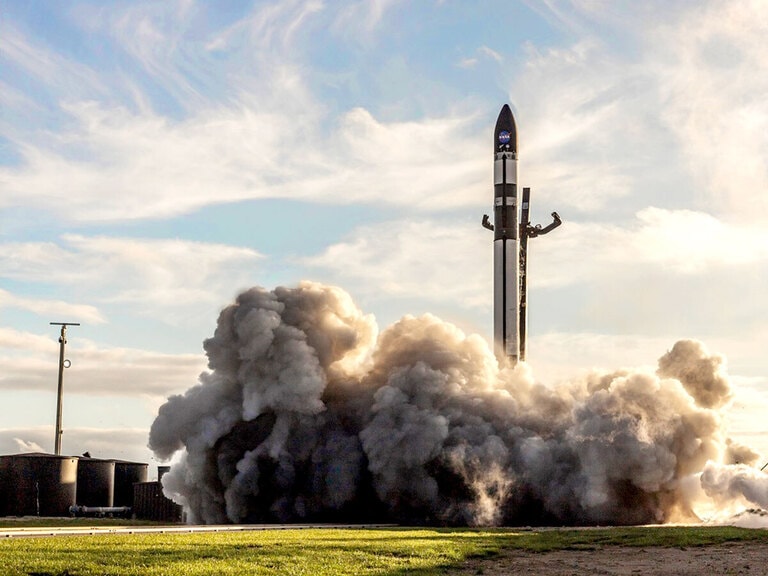Planets Labs [PL] is an Earth imaging company based in San Francisco, California.
The satellite data provider supplies geospatial information to customers across various industries, from agriculture to forestry to mining. However, it generates the bulk of its revenue from contracts with government agencies.
With Q1 2026 earnings due to be reported on June 4, rising defense spending is likely to have been a major growth driver.
Recent Contract Wins
Back in January, Planet Labs inked a $230m deal to build a constellation of its Pelican satellites for an unnamed Asia-Pacific commercial customer. This was later revealed to be JSAT [9412:T], Asia’s largest geostationary satellite operator.
CEO Will Marshall told Reuters that the deal is reflective of more governments wanting satellite sovereignty because of how integral geospatial data is to security and intelligence operations.
“We’ve seen these geopolitical changes, a lot of countries are pushing more for dedicated capabilities … It’s a strong market demand that we’re seeing,” said Marshall.
In March, Planet Labs signed a deal with the European Space Agency to support the Greek government’s plan for a satellite program. This was followed by a deal in May that will see the company provide Earth imagery to the German government to improve its land and water management.
Another recent contract win is an expansion of an existing partnership with Bayer [BAYRY], which will utilize Planet Labs’ satellite imagery and analytics to improve decision-making in its agriculture operations.
PL Stock Takes Off, Then Comes Back Down to Earth
The Planet Labs share price has gained 109.84% in the 12 months through May 30, to $3.84, and has more than doubled since setting a 52-week low of $1.73 on July 10, 2025.
However, the stock has pulled back sharply from a 52-week high of $6.71 on February 10.
Q4 Earnings Disappointment
A big catalyst for the fall in the Planet Labs share price was the company’s Q4 2025 earnings reported on March 20, which missed estimates.
Revenue for the three months to January 31 rose 5% year-over-year to $61.55m, slightly short of the analyst consensus of $62.2m. Adjusted earnings per share came in at -$0.08, much wider than the -$0.03 analysts had been expecting.
The commercial customers that Planet Labs serves have faced headwinds in recent quarters, particularly those in the agriculture sector, but there are signs that revenue is stabilizing, management said on its earnings call. Commercial sector revenue was down 10% in Q4.
In better news, the defense and intelligence segment revenue grew 20% year-over-year in the last quarter of fiscal 2025 and the civil government segment reported a 15% growth.
“I don’t want greater instability in the world, but the fact that it is happening does drive interest in Planet’s data even more strongly,” CEO Marshall told Bloomberg following the earnings release.
In comparison to Planet Labs’s total revenue growth in its Q4 2025, geospatial data peer BlackSky [BKSY] reported a 22% rise for the January–March period, while fellow data and analytics company Spire Global [SPIR] reported revenue of $23.9m for the same period, down from $34.8m a year ago, although that included a $9.6m one-time performance obligation.
Here are how the fundamentals of Planet Labs, BlackSky and Global Spire compare.
| PL | BKSY | SPIR |
Market Cap | $1.13bn | $337.08m | $323.20m |
P/S Ratio | 4.59 | 2.57 | 2.65 |
P/E Ratio | N/A | N/A | N/A |
PEG Ratio (5-Year Expected) | N/A | N/A | N/A |
Estimated Sales Growth (Current Fiscal Year) | 10.72% | 31.95% | -9.25% |
Estimated Sales Growth (Next Fiscal Year) | 14.08% | 27.50% | 7.00% |
Source: Stockanalysis.com
All three stocks could be considered fairly valued or undervalued given their low P/S sales ratios. However, none of the three are profitable yet.
PL Stock: The Investment Case
The Bull Case for Planet Labs
For Q1 2026, being reported on June 4, Planet Labs has guided toward revenue of $61m–63m versus $60.4m in the year-ago quarter.
While this level of growth may be underwhelming, investors should pay attention to any commentary the company may provide on how increased defense spending may have boosted revenue in the February–April period and could drive growth for the rest of the fiscal year.
Demand for its satellite imagery services, especially from governments, resulted in its Q4 2025 remaining performance obligations (RPOs) rising 179% sequentially to $407.5m. Its backlog — calculated as RPOs plus the cancelable amount of contracts — rose 115% to $498.5m.
The Bear Case for Planet Labs
One thing investors will likely want to keep an eye on is how big a loss it logs.
Goldman Sachs analyst Noah Poponak downgraded the stock from ‘buy’ to ‘neutral’ in April, citing persistent losses and macro risks stemming from a potential recession. He lowered his price target from $6 to $3.50, implying a downside of 8.85% from the most recent closing price.
CNBC’s Jim Cramer was asked about Planet Labs during the Lightning Round segment of an April episode of his Fast Money show. “Ever since President Trump came in, we’re not recommending any stocks that are losing money,” said Cramer.
Conclusion
Planet Labs is seeing an increase in demand for its technology and services as governments look to take control of their satellite data and secure infrastructure and intelligence operations.
However, despite its revenue backlog more than doubling in the last quarter, the company is expected to record another loss when Q1 earnings are reported on June 4.
Continue reading for FREE
- Includes free newsletter updates, unsubscribe anytime. Privacy policy





